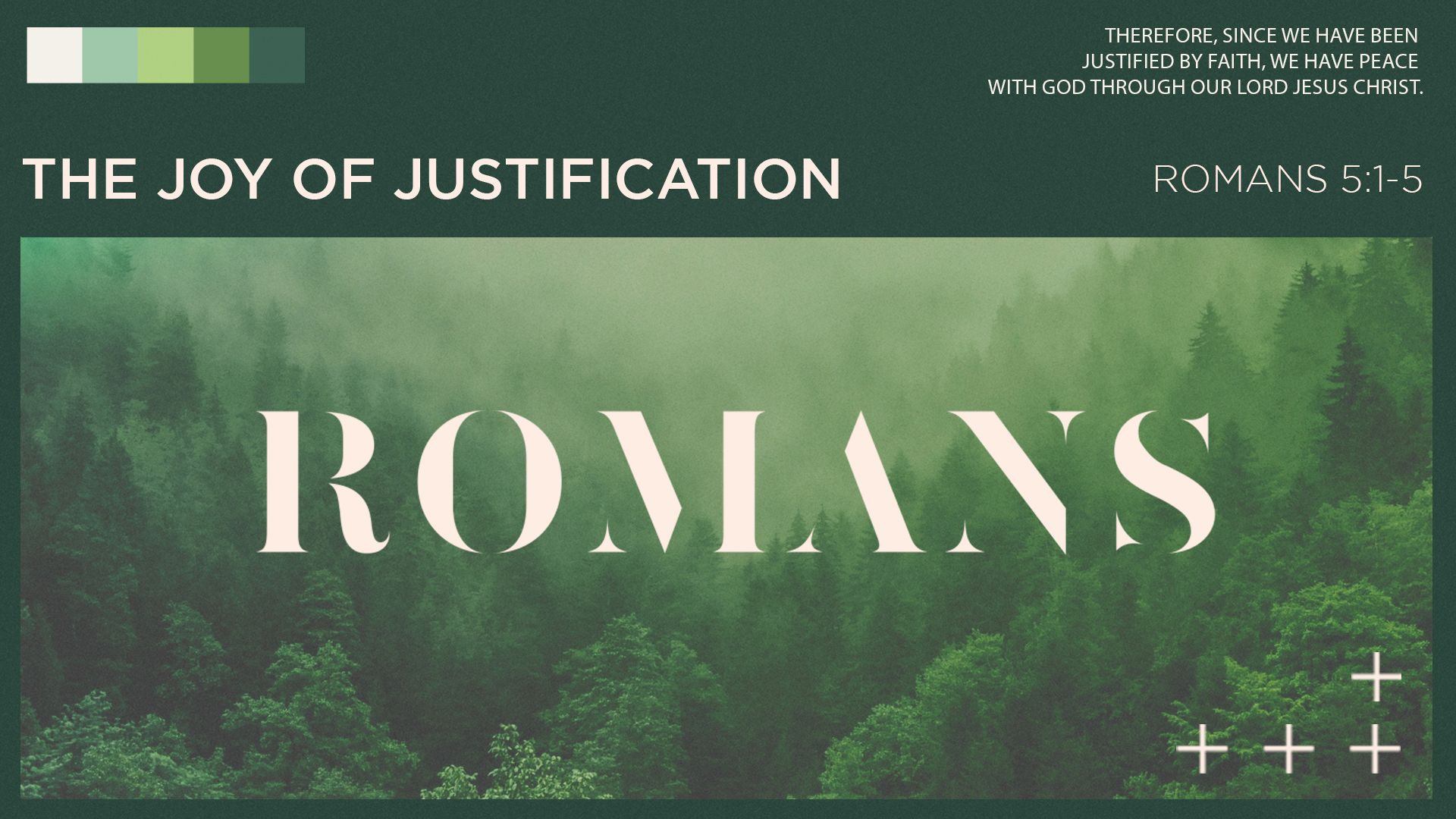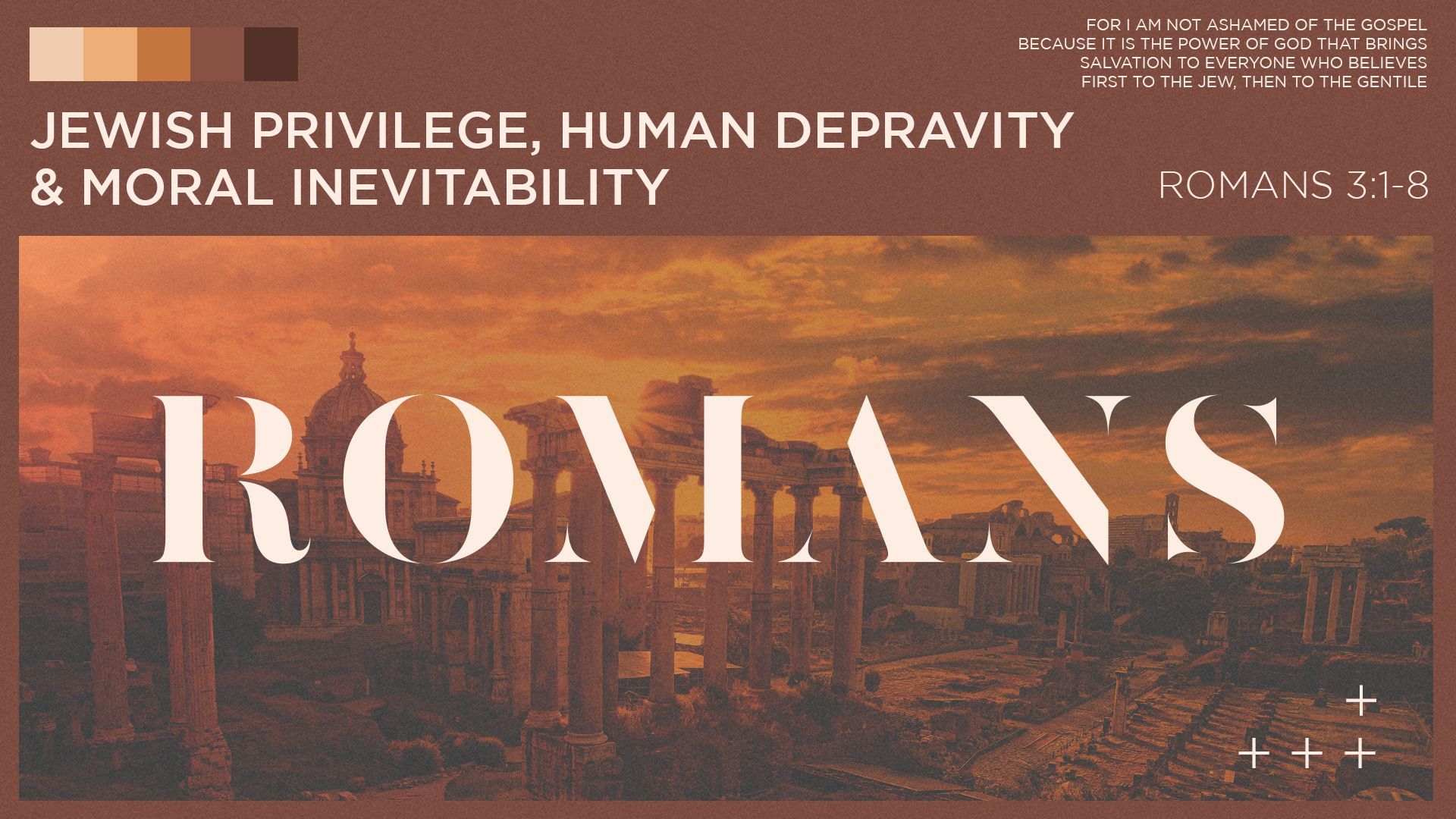Current Sermon Series
Romans:
The Gift of God
Come and embark on a journey through the book of Romans in 2024 with us. We are currently in the second part of our series in Romans, The Gift of God. We will be focused on chapters 3-8.
The central theme Paul emphasizes is that we are justified by God through faith.

29 Apr, 2024
Notes from Lance Shumake's sermon on Sunday, April 28, 2024. Sermon text: Romans 5:1-5 We find joy in the blessings brought by justification —peace with God —access to God’s grace Hebrews 4:16 Let us then with confidence draw near to the throne of grace, that we may receive mercy and find grace to help in time of need. —hope of the glory of God “Christian hope is not uncertain, like our ordinary everyday hopes about the weather or our health; it is a joyful and confident expectation which rests on the promises of God, as we saw in the case of Abraham. And the object of our hope is the glory of God (2), namely his radiant splendor which will in the end be fully displayed. —John R. W. Stott, The Message of Romans We can even find joy in our sufferings “Various kinds of sufferings will come to us, but we can rejoice in them when we recognize that they serve a purpose: to develop our Christian character. In verses 3b–4 Paul shows how a godly response to suffering can initiate a series of virtues, culminating, strikingly, in hope. Note, however, that Paul is not saying that we should rejoice because of suffering. Evil things are still just that—evil—and we never should be happy about them. But by looking beyond the suffering to its divinely intended end, we still can rejoice in the midst of them.” —Douglas J. Moo, Encountering the Book of Romans —suffering produces endurance “ We know this, especially from the experience of God’s people in every generation. Suffering produces perseverance ( hypomonē , endurance). We could not learn endurance without suffering, because without suffering there would be nothing to endure.” —John R. W. Stott, The Message of Romans —endurance builds character —character gives us confident hope Discipleship Questions: How does it change your outlook on life to know that you have peace with God? In what ways have you experienced the greatness of access to God’s grace? How does future certainty bring us lasting hope? Describe a time when you experienced joy in the midst of suffering. How has God used suffering to grow your faith and mature you? What are some ways you have experienced God’s love being poured into your heart?

22 Apr, 2024
Notes from Lance Shumake's sermon on Sunday, April 21, 2024. Sermon text: Romans 4:13-25 Abraham was not justified by works Abraham was not justified through the law Justification comes through faith alone —by faith we are forgiven of sin —by faith we are credited righteousness —by faith we are Abraham’s offspring Galatians 3:29 And if you are Christ’s, then you are Abraham’s offspring, heirs according to promise. The faith of Father Abraham… —is trusting God no matter how things appear “Paul next goes on to remind us of the way Abraham believed the promise of God even when all the tangible evidence seemed to point in the other direction. In brief, as Paul succinctly summarizes the matter in verse 18, Abraham believed “against all hope” yet “in hope.” Specifically, he did not allow all the many reasons to distrust God’s promise to weaken his conviction that God would do just what he had promised.” —Douglas J. Moo, Encountering the Book of Romans —is being convinced of God’s power —is taking God at His word —is unwavering, even when we fail “Abraham did not always live out his faith, his obedience was not perfect, his trust fluctuated; but his faith was never extinguished. He hung on to God’s promises even in his own flaws and failings—and as he did so, he “was strengthened in his faith.” He was able to look at a mistake and say: This has reminded me that my only hope is to trust in God’s promise, and trust in God to fulfill that promise.” —Tim Keller, Romans 1-7 For You Discipleship Questions: Spend some time discussing justification and talk about the effects of it on our lives. What are some ways that you trust God in spite of how things appear or how you feel? How have you experienced your faith being strengthened through God’s Word? What are some examples of times you have taken God at His word and acted on it in your life? What do you think it looks like for us to have unwavering faith based on Abraham’s example?

17 Apr, 2024
Notes from Scott Sutton's sermon on Sunday, April 14, 2024. Sermon text: Romans 4:1-12 V. 1-3 “What then shall we say was gained by Abraham, our forefather according to the flesh? 2 For if Abraham was justified by works, he has something to boast about, but not before God. 3 For what does the Scripture say? “Abraham believed God, and it was counted to him as righteousness.” Abraham was not justified by works. Paul chooses Abraham as an example because it is likely that at this point some of the listeners, especially the Rabbis, would have thought, “No one has room to boast? What about our Father Abraham?” There was a cultural perspective in the Jewish community about Abraham that can be read in the books of Jubilees and Maccabbees. “Abraham was perfect in his dealings with the Lord and gained favor by his righteousness throughout his life”… and they quoted Genesis 15, the very verse that Paul is using here, saying, “was not Abraham found faithful in temptation, and it was reckoned unto him for righteousness?” So Paul is arguing that Abraham was not justified by works, because many in the Roman church believed that Abraham was justified by works! This isn’t just an emphasis in a few chapters, it is the heart of the whole letter. Paul is saying, “If he was justified by works, then sure, he can boast before God, but he is not!” And there is a phrase in verse 3 that we must make sure not to gloss over. How does Paul prove this point and bring clarity to their error? FOR WHAT DOES THE SCRIPTURE SAY? We must understand the Biblical narrative because the cultural narrative is always changing. Far more wisdom and effort has gone into the canonization of Scripture than has gone into the picking it apart to prove someone’s point in a certain cultural moment in time. Some today argue that they are listening to Jesus, but not the Bible because they are separating what Jesus says and what the Bible says. It’s an argumentation technique to say, “Well, Jesus didn’t say that. Paul did.” And the result is that people present themselves and posture themselves to look like followers of Christ while dismissing how Christ fulfills all of Scripture. So what does Paul say to the Roman church who was struggling with how this Gospel of Jesus was going against their cultural norms? “What do the Scriptures say?” Justification by faith isn’t some new idea in Jesus. In fact, Father Abraham was justified by faith. V. 4 Now to the one who works, his wages are not counted as a gift but as his due. God did not owe Abraham Imagine getting your paycheck and it is labeled “a gift from management”! You would probably say, “No, I earned that! Thank you very much! That’s not a gift. That is my money.” Now imagine, going to God, and saying of your right standing before Him, “No, I earned that! That is mine. You owe it to me!” Paul’s hope for the Roman church, and for us today, is that we would really consider thoughts like that and really reckon with the reality that we cannot earn our justification. Paul is saying, “I know I have already said it and defended it and given Abraham as an example of the reality that we can only be justified by faith, but I am saying it yet another way so that you would search yourself. If God owed Abraham, then maybe God could owe you, and God owes no man. For the wages if sin is death. That is our due. That is what we are owed. V. 5-8 “And to the one who does not work but believes in him who justifies the ungodly, his faith is counted as righteousness, 6 just as David also speaks of the blessing of the one to whom God counts righteousness apart from works: “Blessed are those whose lawless deeds are forgiven, and whose sins are covered; blessed is the man against whom the Lord will not count his sin.” Faith was counted to Abraham as righteousness. Paul wants the church to see that Jesus is the thread that runs through all of human history. We can see Jesus in the life of Abraham and we can also see Jesus in the life of David. Two of the most prominent figures in Jewish history are who Paul chooses to prove justification by faith alone. When it comes to justification, faith is opposed to work. God justifies the ungodly because there are no godly ones to be justified. When you hear that Faith was counted to Abraham as righteousness, it might be easy to quickly modify that in your mind, and think, “Oh, so Abraham was faithful, and by being faithful, he became righteous… almost like his faithfulness was a substitute for good works…” And that is wrong. There is a HUGE difference between saying “Through faith Abraham became righteous” and “Through faith Abraham was counted as righteous.” It is a judicial reckoning by God. Or for us it is the difference between saying “Now I am righteous” and “Now I am counted as righteous”… Paul wants the church to know that they need something from God that they cannot achieve on their own, and if they are chasing righteousness by trying to live in the right way by saying and doing the right things, they will never find it. You need for God to not count your sin against you. V. 9-12 Is this blessing then only for the circumcised, or also for the uncircumcised? For we say that faith was counted to Abraham as righteousness. 10 How then was it counted to him? Was it before or after he had been circumcised? It was not after, but before he was circumcised. 11 He received the sign of circumcision as a seal of the righteousness that he had by faith while he was still uncircumcised. The purpose was to make him the father of all who believe without being circumcised, so that righteousness would be counted to them as well, 12 and to make him the father of the circumcised who are not merely circumcised but who also walk in the footsteps of the faith that our father Abraham had before he was circumcised. Circumcision is a sign. So for those asking, “Was Abraham’s faith counted to him as righteousness before or after the act of circumcision?”, Paul’s answer is simply, “before”. Why? Because it was a sign. Application: Walk in the Footsteps of Faith … Abraham was not ju stified by works… I am not justified by works. God did not owe Abraham anything… God does not owe me anything. Faith was counted to Abraham as righteousness… Faith can be counted to me as righteousness. Circumcision is a sign… By faith in Christ, I am brought into a rich heritage where my story is the story of a people who were only ever justified by faith alone. So rather than resting in my works, I can rest in Christ. Discipleship Questions: If we know we cannot earn a right standing before God, why do so many of us continue to try? Are there any ways in which you still act and think as if God owes you something? How is circumcision still beneficial to Gentiles in 2024? How does an understanding of the Biblical narrative help us against an ever-changing cultural narrative? Be specific. What are some specific cultural narratives that you and your children struggle with? How does the Biblical narrative help to bring understanding and peace? Why does it matter that your story is the story of a people? Of the 4 footsteps of faith mentioned, which do you struggle with the most? Why? Faith is trusting God's promises. What are some promises that we can lay hold of and rest in?

10 Apr, 2024
Notes from Ky Martin's sermon on Sunday, April 7, 2024. Sermon text: Romans 3:27-31 Not all boasting is bad We are boastful when we think that… We have earned God’s approval God was accepting Abraham, Moses, David and all the Old Testament saints when they repented and trusted in his mercy, but he accepted them on the basis of the future work of Christ. He was already the just Judge who justifies his people. -Tim Keller We are more valuable than others 2 Corinthians 4:6 For God, who said, “Let light shine out of darkness,” has shone in our hearts to give the light of the knowledge of the glory of God in the face of Jesus Christ We can take credit for our accomplishments Jeremiah 9:23-24a Thus says the Lord: “Let not the wise man boast in his wisdom, let not the mighty man boast in his might, let not the rich man boast in his riches, but let him who boasts boast in this, that he understands and knows me… “Why do we imagine God to be so unmoved by our heart-felt attempts at obedience? He is, after all, our heavenly Father. What sort of father looks at his daughter’s homemade birthday card and complains that the color scheme is all wrong? What kind of mother says to her son, after he gladly cleaned the garage but put the paint cans on the wrong shelf, ‘This is worthless in my sight!’?” - Kevin DeYoung 1 Corinthians. 3:5-6 What then is Apollos? What is Paul? Servants through whom you believed, as the Lord assigned to each. I planted, Apollos watered, but God gave the growth. 1 Corinthians. 3:10 According to the grace of God given to me, like a skilled master builder I laid a foundation, and someone else is building upon it. Discipleship Questions: When Paul says in verse 27 that boasting is excluded, what does he mean by that? Do you ever struggle with believing that some people’s testimonies are more miraculous than others? (the guy who grew up in church VS the former drug addict). How does this passage remind us that every salvation is a miracle of grace? Do you even find yourself believing that you’re less deserving of God’s grace than others? Do you struggle with seeing other believers as not being worth your time and investment due to their lack of accomplishments or achievements? What’s the difference in a healthy pride such as Paul mentions in Romans 15:17 and the boastfulness he warns about in Romans 3:27?

03 Apr, 2024
Notes from Ky Martin's sermon on Sunday, March 24, 2024. Sermon text: Romans Romans 3:21-26 "The chief point, and the very central place of the Epistle, and of the whole Bible.” -Martin Luther Rom. 1:17 “For in it the righteousness of God is revealed from faith for faith, as it is written, “The righteous shall live by faith.” Rom 3:21-22a But now the righteousness of God has been manifested apart from the law, although the Law and the Prophets bear witness to it— 22 the righteousness of God through faith in Jesus Christ for all who believe. Word Pictures in Romans 3: Justification The cross was a drama in the divine courtroom, in which Jesus took our death sentence and we walked free. “Only upon the cross does one die with hands outstretched. Therefore it was fitting for the Lord to endure this, and to stretch out his hands, that with the one he might draw the ancient people [Israel] and with the other those from the Gentiles, and join both together in himself.” -Athanasius Redemption Old Testament Concepts: Debt, captivity, exile, liability to execution New Testament Word: To purchase from captivity or slavery (ransom) “Sometimes it is deliverance from slavery and sometimes from a sentence of death. But both inside and outside the Bible that is the usage… always denotes deliverance from a state of captivity or slavery or from a death sentence… by the payment of a price.” Leon Morris Elements of Redemption: Plight John 8:34 Jesus answered them, “Truly, truly, I say to you, everyone who practices sin is a slave to sin.” Psalm 49:7-8 Truly no man can ransom another, or give to God the price of his life, or the ransom of their life is costly and can never suffice, Price 1 Peter 1:18-19 knowing that you were ransomed from the futile ways inherited from your forefathers, not with perishable things such as silver or gold, but with the precious blood of Christ, like that of a lamb without blemish or spot Galatians 3:13 Christ redeemed us from the curse of the law by becoming a curse for us—for it is written, “Cursed is everyone who is hanged on a tree” Mark 10:45 For even the Son of Man came not to be served but to serve, and to give his life as a ransom for many.” Person: Galatians 4:4-5 But when the fullness of time had come, God sent forth his Son, born of woman, born under the law, to redeem those who were under the law, so that we might receive adoption as sons. Discipleship Questions: What is the setting of the word picture painted by “Justification?”Do you run to this imagery when you experience guilt for sin? Why or why not? What comes to mind when you think of the word “redeemed” or “redemption?” What Old Testament passages or stories come to mind when you think of this word? A redemption or ransom in the New Testament would involve a plight, a payment, and a person. Discuss each of those elements and how they apply to our situation. God loved us enough to pay a ransom price of (the blood of Jesus) order to free us. When we understand our story through that lens, how does it affect our outlook towards God and ourselves?

25 Mar, 2024
Notes from Ky Martin's sermon on Sunday, March 24, 2024. Sermon text: Romans Romans 3:21-26 "The chief point, and the very central place of the Epistle, and of the whole Bible.” -Martin Luther Rom. 1:17 “For in it the righteousness of God is revealed from faith for faith, as it is written, “The righteous shall live by faith.” Rom 3:21-22a But now the righteousness of God has been manifested apart from the law, although the Law and the Prophets bear witness to it— 22 the righteousness of God through faith in Jesus Christ for all who believe. Word Pictures in Romans 3: Justification The cross was a drama in the divine courtroom, in which Jesus took our death sentence and we walked free. “Only upon the cross does one die with hands outstretched. Therefore it was fitting for the Lord to endure this, and to stretch out his hands, that with the one he might draw the ancient people [Israel] and with the other those from the Gentiles, and join both together in himself.” -Athanasius Redemption Old Testament Concepts: Debt, captivity, exile, liability to execution New Testament Word: To purchase from captivity or slavery (ransom) “Sometimes it is deliverance from slavery and sometimes from a sentence of death. But both inside and outside the Bible that is the usage… always denotes deliverance from a state of captivity or slavery or from a death sentence… by the payment of a price.” Leon Morris Elements of Redemption: Plight John 8:34 Jesus answered them, “Truly, truly, I say to you, everyone who practices sin is a slave to sin.” Psalm 49:7-8 Truly no man can ransom another, or give to God the price of his life, or the ransom of their life is costly and can never suffice, Price 1 Peter 1:18-19 knowing that you were ransomed from the futile ways inherited from your forefathers, not with perishable things such as silver or gold, but with the precious blood of Christ, like that of a lamb without blemish or spot Galatians 3:13 Christ redeemed us from the curse of the law by becoming a curse for us—for it is written, “Cursed is everyone who is hanged on a tree” Mark 10:45 For even the Son of Man came not to be served but to serve, and to give his life as a ransom for many.” Person: Galatians 4:4-5 But when the fullness of time had come, God sent forth his Son, born of woman, born under the law, to redeem those who were under the law, so that we might receive adoption as sons. Discipleship Questions: What is the setting of the word picture painted by “Justification?”Do you run to this imagery when you experience guilt for sin? Why or why not? What comes to mind when you think of the word “redeemed” or “redemption?” What Old Testament passages or stories come to mind when you think of this word? A redemption or ransom in the New Testament would involve a plight, a payment, and a person. Discuss each of those elements and how they apply to our situation. God loved us enough to pay a ransom price of (the blood of Jesus) order to free us. When we understand our story through that lens, how does it affect our outlook towards God and ourselves?

17 Mar, 2024
Notes from Stan Britton's sermon on Sunday, March 17, 2024. Sermon text: Romans Romans 3:21-26 As we come to this turning point in Romans, we can finally get a sense for the Gospel/Good News as the remedy for our lawbreaking sinfulness. It is the beginning of The Rest of The Story. We aren’t just left in sin or left to judgment under the Law. Because of the Law, we are aware of God’s righteousness – vs 20-21 God’s righteousness is ours by faith in Christ alone - vs 22 We can interpret Romans 3:22 in 3 ways: First, through faith in Jesus Christ – by placing faith in Christ alone for salvation. Second, by bearing witness to the faithfulness of Jesus Christ – He kept the law perfectly. Third, because of God’s faithfulness to us through Jesus Christ – He didn’t leave us to languish in our sin but provided a righteous, sufficient Savior for us. Leon Morris – Commentary on Romans We lack God’s glory altogether – vs 23 Justification isn’t something you do, it’s something you receive – vs 24 God gave Christ as the sacrifice to maintain His righteous standards and make a way for our justification – vs 25-26 “You contribute nothing to your salvation except the sin that made it necessary.” - Jonathan Edwards Discipleship Questions: As you grow in your walk with God, how have His righteous standards become clearer to you? We sometimes lose the meaning of “putting our faith in Christ”. What does that mean to you in light of Romans 3:22? How do you connect the problem of Romans 3:23 with the solution of Romans 3:24? God demonstrates His mercy in Romans 3:25 (passing over sins previously committed). How does worship increase when you recognize God’s mercy in your life? Read Ezekiel 36:22-27 – Discuss God’s work in protecting His name, redeeming you, giving you a new heart and guiding you by His spirit. How can you encourage yourself and other Christ followers to rest in being justified through faith in Christ alone?

12 Mar, 2024
Notes from Lance Shumake's sermon on Sunday, March 10, 2024. Sermon text: Romans Romans 3:9-20 Sin affects every part of us The term for this is total depravity . This doctrine does not hold that everyone is corrupt in every way, nor does it deny that unbelievers can act lawfully. It means that the whole of human nature is fallen, that sin corrupts every faculty, and that our best deeds are tainted by imperfect motives. —Daniel M. Doriani, Romans Sin affects every one of us We have no excuse before a holy God We should not try to evade it by changing the subject and talking instead of the need for self-esteem, or by blaming our behavior on our genes, nurturing, education or society. It is an essential part of our dignity as human beings that, however much we may have been affected by negative influences, we are not their helpless victims, but rather responsible for our conduct. —John R. W. Stott, The Message of Romans We have no way to make ourselves right with God People are imprisoned under the power of sin. The point is vital if we are to appreciate the need and power of the gospel. If people simply were sinners, then perhaps all they would need would be a teacher to inform them about what is right. But people are under sin. They need a liberator. And Paul will present Christ, through the power of God’s righteousness unleashed in the gospel, as just such a liberator. —Douglas J. Moo, Encountering the Book of Romans Discipleship Questions: All sin is a rejection of God. How do you see that being true in your life? How have you experienced sin’s effects in every part of your life? Why is it important to understand the universality of sin? What do you think Paul means when he says no one seeks God? Read John 6:44 and discuss. In what ways have you found yourself making excuses for your sin instead of owning it? Why is it so tempting to try to make excuses for our sin? What does this passage say to the person who thinks he can earn a right standing with God? How does it help us hear and receive the gospel when we understand the bad news first?

04 Mar, 2024
Notes from Scott Sutton's sermon on Sunday, March 3, 2024. Sermon text: Romans Romans 3:1-8 We live in a culture where everything is relative, little is objective, and we are (largely through social media) encouraged to express all of our differing opinions on everything. We’ve come to believe that we can all have our own versions of truth and somehow they can all still remain true. However, today’s Text reminds us that God is not relative. God is not subject to our personal feelings and tastes. There are not differing opinions on who God is or what God is about that can all be good and true at the same time. 2 Corinthians 4 says that the god of this world wants to blind the minds of unbelievers from seeing the glory of God in the face of Christ. One way to do that is to distort their view of God. Paul, in Romans 3, is proclaiming truth, fielding objections, and reminding humanity about our humanness and God’s Godness. This is a part of a larger portion of Scripture that addresses the sometimes uncomfortable subject of human depravity. Usually, the ones most opposed to the concept of human depravity are the humans. So Paul addresses them accordingly. Paul has just made the statement that “For no one is a Jew who is merely one outwardly, nor is circumcision outward and physical. But a Jew is one inwardly, and circumcision is a matter of the heart, by the Spirit, not by the letter. His praise is not from man but from God.” The church in Rome is made up of converted Gentiles who now proclaim Christ and Jews who also proclaim Christ have returned to the church in Rome and they are still trying to figure out life together. As Paul levels the playing field, explaining that a circumcised Jew is really no better off than a righteous Gentile, some objections arise. And those 4 objections frame our outline this morning… Objection # 1: Then what advantage has the Jew? Or what is the value if circumcision? One commentator explains the objection like this… “Jews everywhere were furious that Paul appeared to dissolve their distinctive advantage. What was the point of being the chosen people of God, marked off from the pagan world by the distinguishing mark of circumcision, if in the end a faithful Gentile might fare better than a Jew?” - Seccombe - This is a picture of Jewish Privilege… or perhaps religious privilege. - “Romish” thoughts would have led them to put great stock in things like the priesthood. - Paul seems to be undermining God’s design… Answer # 1: Much in every way! To begin with, the Jews were entrusted with the oracles of God. - Interestingly, Paul says, “To begin with” OR “First of all”, but here only mentions the oracles of God. Later in chapter 9 he picks the list back up and goes into greater details. But here, the advantage is “You have the Scriptures!” - Don’t gloss over this! Consider what it means. In Romans 1 we saw that any human being can step outside and look up to the stars and know that there is a God and we are subject to Him. In Romans 2 we saw that any human can look inside and find a law written on their heart and know that there is a God and we are subject to Him. But it was only first to the Jews that God made Himself known! - What advantage do you have? You learned from God about God. He gave you His words when no one else had them. Through them you learned that He is a compassionate and gracious God, slow to anger and abounding in steadfast love and faithfulness, maintaining love to thousands, and forgiving wickedness, rebellion, and sin. You learned that He is the Alpha and the Omega, the Almighty, a Good Shepherd. He is all-knowing, all-powerful, all-present. He is Sovereign. He is sovereign. He is unchanging. He is holy. He is just. He is righteous. He created us and has expectations for us. He has a plan for the world. He will judge. He will create a new heavens and a new earth. - None of us here today and no non-Jew in all of history would know those things if they were not first entrusted to the Jews by God! And at this point you might think they would respond “Good point Paul!” Instead, another objection is raised. Objection # 2: What if some were unfaithful? Does their faithlessness nullify the faithfulness of God? Answer # 2: By no means! Let God be true though every one were a liar, as it is written, “That you may be justified in your words, and prevail when you are judged.” - This argument is literally as old as mankind… So God gave His oracles… His expectations for His creation… and creation blames God when it goes wrong. “The woman that you gave me caused me to sin.” So often the argument for humans caught in sin and facing judgment is “You made me like this”… “You made me to think like this… You made me with these strong desires…” Paul is pointing out that we compound our guilt when we misuse God’s good gifts. OR, to say it in a Romans 1 way, we compound our guilt when we trade the truth about God for a lie and worship the creature rather than the Creator. - Seccombe: “To carry back to God the blame for our abuse of these gifts is as perverse as it is common.” - To answer their objection, Paul goes to Psalm 51:4… where David has been caught in the horrible sins of adultery and murder, rather than saying “Well God, you gave me these impulses… you could have made her bathe inside… her husband could have loved and appreciated her more…”, he says, “Against you and you only have I sinned and done what is evil in your sight, so that you may be justified in your words and blameless in your judgment.” There is a moral inevitability that David has finally come to grips with and he realizes that there is nothing he can say in his own defense. God is right. David is wrong. And then the objections become even more evil… Objection # 3: But if our unrighteousness serves to show the righteousness of God, what shall we say? That God is unrighteous to inflict wrath on us? - This is not a straw man that Paul is kicking. This is a real objection. Perhaps this is Paul arguing with his old Pharisaical self… - I sin. I am unrighteous. God gets glory for being a righteous Judge. Doesn’t that make God unrighteous for inflicting wrath on us who are only showing how righteous of a judge He is? - Paul is embarrassed by such a suggestion. (I speak in a human way). It is almost like he is saying, “I don’t even want to be associated with such an evil and heretical statement about the Almighty.” Answer # 3: By no means! For then how could God judge the world? - Meaning… If God cannot judge Jews for such behavior and the heart behind it, how then can God judge the world? - Because the one thing we can agree on is the undeniable truth that God will judge the world! Right?! Objection # 4: But if through my lie God’s truth abounds to his glory, why am I still being condemned as a sinner. And why not do evil that good may come? - As some slanderously charge us with saying… - This is an off the rails, out of touch with reality, flatly evil argument. Answer # 4: N/A Or to be more specific: N/A… Their condemnation is just… Application: 1.) Don’t assume religious privilege 2.) Don’t assume that God is subject to your feelings 3.) Don’t blame God for your sin 4.) Treasure the oracles of God 5.) Defend the oracles of God (You can’t manage what you don’t measure and you can’t defend what you don’t treasure.) *Apologetics & Evangelism 6.) Consider your undeniable truths Discipleship Questions: 1.) What are some objections that are raised against the church today? 2.) How can we Biblically defend truth and answer those objections? 3.) Put the phrase “You can’t defend what you don’t treasure” in your own words. 4.) What does religious privilege look like today? How might it play out in our lives on a Tuesday? 5.) What are some examples of assuming that God is subject to our feelings? I feel __________ so God must be __________. 6.) How have you been guilty of blaming God for your sin? It’s your fault that I am ______________. 7.) What are some healthy disciplines that will help us to both treasure and defend the oracles of God? 8.) What could possibly make us not treasure the oracles of God? 9.) What are your undeniable truths? Are you teaching them to your children?

28 Feb, 2024
Notes from Lance Shumake's sermon on Sunday, February 25, 2024. Sermon text: Romans 2:17-29 We don’t find confidence in having the law We don’t find confidence in keeping the law We need to pose ourselves the same challenge: is our church community, and are we as individuals, attractive? Is our humility, love in hard situations, grace under pressure, and so on obvious for others to see? Are we living as an advertisement for God, or as a “Keep clear” sign? Only the gospel produces churches and people who commend God to the world. Moralism cannot. —Tim Keller, Romans for You We don’t find confidence in outward signs So what if you have been baptized? So what if you are a church member? This only counts for anything if there has been a real change in your life, if your heart has been truly affected. Don’t you know that you are not a Christian if you are only one externally, that real Christianity is not about having confidence in external things? No, a Christian is someone who is a Christian inside; what matters is inner baptism, a heart-membership of God’s people. And this is a supernatural work, not a human one. —Tim Keller, Romans for You We only find confidence in Jesus as He changes our hearts Isn’t this a fitting climax to the argument in chapter 2? What Paul has been driving at all along is this: God is going to look at the heart. We can come adorned with all kinds of externals, but if there is no circumcision of the heart, it will be to no avail. He is a Jew who is one inwardly, and real circumcision is of the heart, by the Spirit—that is by the Holy Spirit—not by the letter. —R. C. Sproul, The Gospel of God Philippians 3:4–9 [4]...If anyone else thinks he has reason for confidence in the flesh, I have more: [5] circumcised on the eighth day, of the people of Israel, of the tribe of Benjamin, a Hebrew of Hebrews; as to the law, a Pharisee; [6] as to zeal, a persecutor of the church; as to righteousness under the law, blameless. [7] But whatever gain I had, I counted as loss for the sake of Christ. [8] Indeed, I count everything as loss because of the surpassing worth of knowing Christ Jesus my Lord. For his sake I have suffered the loss of all things and count them as rubbish, in order that I may gain Christ [9] and be found in him, not having a righteousness of my own that comes from the law, but that which comes through faith in Christ, the righteousness from God that depends on faith. Discipleship Questions: In what ways do you find it tempting to put your confidence in having the law? In what ways do you find it tempting to put your confidence in keeping the law? In what ways is the charge of hypocrisy against Christians wrong and unfair? In what ways is the charge of hypocrisy against Christians a valid concern, and how do we fix it? What are the problems with putting our confidence in outward signs? What does it look like to find your confidence in Jesus and His ability to change your heart? What is the evidence of a changed heart, and how is that different from the warnings in this passage?
Sermon Archives
We've covered everything from Acts to Zechariah. Check out past sermons in our archives!
Join us!
Saturday afternoons at 5:00 and
Sunday mornings at 8:30, 9:45, and 11 at Heritage Christian Academy in Rockwall
1408 S. Goliad St.
Rockwall, TX
Please send mail to:
PO Box 1015 | Rockwall, TX 75087
Subscribe to our weekly updates:
Contact Us
Thank you for your interest in our weekly newsletter!
Oops, there was an error sending your message.
Please try again later
Please try again later





